24 Jul2020
By Linda Minor

Join AACTE at its inaugural, virtual 2020 Washington Week this September. You will be able to connect with peers from around the nation under the event’s theme Your Voice Matters. Whether you’re joining the State Leaders Institute, Holmes Policy Institute or Advanced Policy Course, and/or Day on the Hill, you won’t want to miss this opportunity to learn, work, and advocate together!
Here’s what past attendees had to say about the events:
23 Jul2020
By Ashley White and Jane E. West
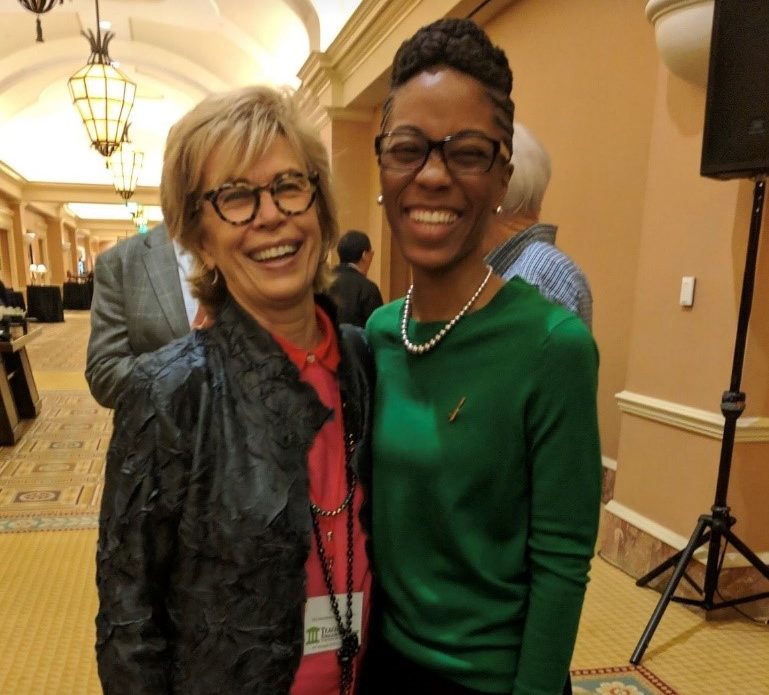 In Part 2 of this Q&A feature, AACTE consultant Jane West, a former teacher with a doctorate in special education and 30 years of policy experience in the nation’s capital, and Holmes Program Alumna Ashley L. White, assistant professor at the University of Wisconsin and 2019-20 Joseph P. Kennedy Fellow, share their mentoring/mentee relationship and how it has evolved over time to address race. (Read Part 1.)
In Part 2 of this Q&A feature, AACTE consultant Jane West, a former teacher with a doctorate in special education and 30 years of policy experience in the nation’s capital, and Holmes Program Alumna Ashley L. White, assistant professor at the University of Wisconsin and 2019-20 Joseph P. Kennedy Fellow, share their mentoring/mentee relationship and how it has evolved over time to address race. (Read Part 1.)
Q: Describe a good white ally.
White: This is not an all-encompassing definition and I am not the monolithic expert—I am speaking from my experiences in dealing with White people all my life, some who get it and many who do not. Allies of any kind have to accept the reality of system and practices that have put them in a position of privilege while disenfranchising others (e.g., the notion of heterosexuality or “able-bodies” as superior forms of existence). Allies must value the whole over the self. Allies must recognize that if one suffers, all suffer, even if not immediately. Allies must embrace their ignorance and lack of understanding in order to counteract these.
As it pertains to the subject of racism in society, racism in education, White allies have to accept the reality of racism in every system and they also have to accept that no matter the topic, particularly as it relates to education, issues of race cement long-standing inequities that cannot be resolved without centering the issues of race. In other words, White allies don’t avoid our country’s foundation, which is built upon individual and systematic racism for the gain of the dominant class. White allies must learn to be quiet when Black and Brown folks are speaking about their experiences and perspectives. White allies must learn not to interrupt and to question themselves, especially when they feel defensive, undermined, or fearful. White allies have to stop hiding behind rhetoric of equity and understanding when their actions demonstrate the very opposite. White allies have to be willing to ask questions, not to prove they are right, but because they know they are wrong.
23 Jul2020
By Stephen Canipe
 When the COVID-19 pandemic began, many teachers, students, and parents rushed to navigate online learning. Some schools may reopen with social distancing guidelines in place, while others may incorporate a virtual component. To limit COVID-19 exposure while maintaining the quality of education for students, educators will need to embrace online instruction.
When the COVID-19 pandemic began, many teachers, students, and parents rushed to navigate online learning. Some schools may reopen with social distancing guidelines in place, while others may incorporate a virtual component. To limit COVID-19 exposure while maintaining the quality of education for students, educators will need to embrace online instruction.
Navigating new technology can be a big hurdle for veteran teachers. As many school districts are announcing plans to incorporate virtual learning for the upcoming school year, there will be little time for teachers to prepare. Seasoned educators will need a lot of training to master remote instruction and help their students succeed.
Teacher candidates enrolled in online programs can help bridge the gap. These candidates have developed technology skills and experienced asynchronous learning, which puts them in a great position to pivot to remote teaching. With 50 years of experience in distance education and online learning, Walden University faculty are prepared to provide teacher candidates with the knowledge and experience needed for online instruction in PreK-12 schools. Walden even helps teacher candidates develop and practice their skills for the classroom through virtual reality training simulations.
23 Jul2020
By Jerrica Thurman
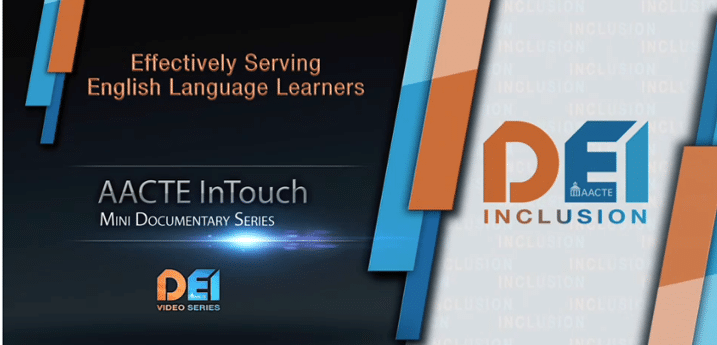
Ed Prep Matters features the “Revolutionizing Education” column to spotlight the many ways AACTE, member institutions, and partners are pioneering leading-edge research, models, strategies and programs that focus on the three core values outlined in the current AACTE strategic plan: Diversity, Equity, and Inclusion; Quality and Impact; and Inquiry and Innovation.
In this final installment of the first Diversity, Equity and Inclusion video series, AACTE members discuss the importance of preparing high quality teachers to educate the growing population of English language learners in the U.S. Statistics show English language learners currently represent 25% of the student body and are expected to grow to 50% within the next five years.
In “Effectively Serving English Language Learners,” Jacqueline Rodriguez, AACTE Vice President, Research, Policy and Advocacy said, “according to the U.S. Department of Education, we’ve seen dramatic increases in English language learners across the country. Some states have increases of over 40% since 2010.” “It’s very important now that we see how our population of students is changing, and what our teacher candidates are facing in the future,” said Cathleen Skinner, director of world languages for Oklahoma State Department of Education. “[We need] to ensure that we are providing our candidates with a kind of content to meet the needs of today’s diverse students, and to make sure that they are comfortable and have had experiences working with families and communities that differ from their own,” said Wanda Blanchett, dean of the graduate school of education at Rutgers University New Brunswick. “That means the teachers are going to have to develop relationships with people outside the educational community,” said Brian Williams, director of the Alonzo A. Crim Center for Urban Educational Excellence at Georgia State University.
Watch the full video.
View the complete first series of AACTE’s DEI videos on the Video Wall. Stay tuned for the second series of the DEI videos coming this fall. Help AACTE spread the word by sharing the videos with your social network!
23 Jul2020
By Alexander Cuenca
 The following article is Part 2 of an article by AACTE member Alex Cuenca in which he highlights the tensions involved in continuing student teaching in the fall and shares a guidepost for educator preparation programs during the COVID-19 pandemic. Read Part 1.
The following article is Part 2 of an article by AACTE member Alex Cuenca in which he highlights the tensions involved in continuing student teaching in the fall and shares a guidepost for educator preparation programs during the COVID-19 pandemic. Read Part 1.
In my previous post, I explored how the belief that “experience” is the most authentic route for teacher learning creates an overreliance on field experiences and student teaching in teacher education programs. With wildly different state, local, and institutional responses to the COVID-19 crisis, teacher education programs are now left to navigate public policy on their own. Given the pedagogical power yielded to “experience” in teacher education, some programs (if allowed) will be tempted to continue with placements in fall during a health crisis because preparation without field experiences seems inconceivable. To be clear, the overriding concern ought to be for the health and wellbeing of our prospective teachers. Wondering whether we should place human bodies in a potentially dangerous situation during a global pandemic should not be a wondering at all. Yet, even if we suspend the recognition that schools are potentially perilous sites for the health of our teacher candidates, “experience” still fails as a sound rationale.
An additional layer of regulations based on the fear of spreading a virus in schools will create unnatural permutations to the already idiosyncratic nature of teaching and learning. The new questions raised by teaching in a pandemic are not just a logical variant of the typical uncertainties, but instead a novel unpredictability. Masks, social distancing, and prohibiting sharing will become new rules to enforce and police. Teaching and learning, which is dependent on social interaction will be socially distant. Teachers will have to divide their curricular and pedagogical planning and teaching between remote and face-to-face populations. And, whatever norms teachers construct in this uncertain environment will have to be immediately adjusted when schools intermittently close because of a positive COVID result. The uncertainty of schooling during a pandemic is perhaps best captured by Sarah Mulhern Gross, a New Jersey English teacher who has compiled over 350 questions that teachers have about teaching in the fall. Among this list are a series of questions pertinent to teacher education:
- If a preservice teacher is exposed to COVID-19 while teaching will they be able to get tested through the district or will they have to find their own means to do so?
- How will preservice teachers complete sections of the edTPA that require student collaboration?
- How will preservice and coopeting teachers maintain social distancing while working with each other?
- If a preservice teacher is forced into quarantine due to exposure could it delay the completion of their program?
- Will preservice teachers be encouraged to take sick days? Historically they risk losing credit if they have absences.
If experience is paramount, is an experience in a milieu of prodigious uncertainty what teacher education programs want to deliver in the fall?
21 Jul2020
By Lynn M. Gangone
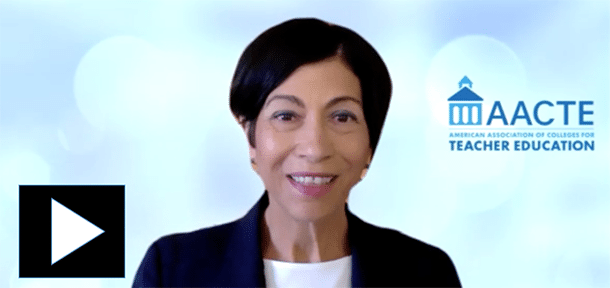
Greetings from your National Office team. Thanks to all of our members who stay in touch with us. Hearing how you navigate the complex issues fueled by the coronavirus pandemic, within your local communities, allows all members to benefit from your hard-earned lessons. Additionally, our collective work in educator preparation advocacy ensures that there are federal and state funds to support ALL students. AACTE maintains its strong commitment to advocacy, particularly at this time; know that we are taking a stand and advocating for legislation and initiatives that promote the safe reopening of our member institutions this fall. Please take a few minutes to watch the video above and learn more.
You can support AACTE’s advocacy work by joining our virtual 2020 Washington Week this September. Your voice matters regarding the current federal and state policies impacting colleges of education and their recovery from COVID-19. You can learn more about AACTE’s inaugural virtual conference at aacte.org.
20 Jul2020
By Ashley White and Jane E. West
In Part 1 of this Q&A feature, AACTE consultant Jane West, a former teacher with a doctorate in special education and 30 years of policy experience in the nation’s capital, and Holmes Program Alumna Ashley L. White, assistant professor at the University of Wisconsin and 2019-20 Joseph P. Kennedy Fellow, share their mentoring/mentee relationship and how it has evolved over time to address race.
Q: What is the nature of your mentoring relationship?
 White: Through my doctoral work, I became very interested in disability policy. It was through this interest that I met Jane. Anyone who knows about SPED/disability policy knows Dr. Jane West. What I didn’t know before interacting with Jane is that, while she was an advocate for the interests of special education and students with disabilities, she was aware of the structural and ideological inconsistencies that float right beneath the surface of the equity rhetoric that dominates disability advocacy.
White: Through my doctoral work, I became very interested in disability policy. It was through this interest that I met Jane. Anyone who knows about SPED/disability policy knows Dr. Jane West. What I didn’t know before interacting with Jane is that, while she was an advocate for the interests of special education and students with disabilities, she was aware of the structural and ideological inconsistencies that float right beneath the surface of the equity rhetoric that dominates disability advocacy.
West: I had the good fortune to meet Ashley as a doctoral student through her work with The Higher Education Consortium for Special Education—an organization with which I consult. Ashley was keenly interested in advocacy and policy—my areas of focus—so we formed a natural alliance. I was, and am, pleased to mentor her in those areas as she navigated her doctoral work and her career.
17 Jul2020
By Monika Jo
Since AACTE and Mursion launched the Education Roundtable series, we have had the pleasure of showcasing the work of educators, who have integrated teacher training via virtual reality (VR) simulation into their respective programs or are studying the various aspects of this modality.
In an upcoming three-part mini-series, Carrie Straub, executive director of education programs and research at Mursion, will host a team from Harvard Graduate School of Education (HGSE) who have generously offered to share the magic behind their work. They will upack and discuss the following:
- Recruiting and training simulation specialists
- The development of simulations including how participants are oriented into Mursion experiences, models for simulation designs, and post simulation activities aimed at transferring skills
- The development of four simulations developed through the Reach Every Reader grant which HGSE designed to develop teachers as critical thinkers and learners in the classroom alongside their students
17 Jul2020
By Linda Minor
 AACTE is excited to offer its virtual 2020 Washington Week experience this September. The event dates have changed to offer you more opportunities to participate. Here’s the lineup:
AACTE is excited to offer its virtual 2020 Washington Week experience this September. The event dates have changed to offer you more opportunities to participate. Here’s the lineup:
Holmes Advanced Policy Course: September 2-3
On September 2, attendees will learn what to expect during the event and hear from a keynote speaker. The September 3 activities will include interactive breakout sessions and a congressional panel.
Holmes Policy Institute: September 8-10
On September 8, attendees will participate in a welcome session and engaging breakouts. Keynote speakers and panelists will show participants how to advocate for educator preparation through lively discussions and group activities. On September 10, participants will enjoy a virtual reception, including interactive games, to conclude the event.
Day on the Hill: September 9-10 and September 15-16
13 Jul2020
By Lynn M. Gangone
 We live in a society that is rapidly changing. The worldwide pandemic has shown us the harsh, but important, reality that divisiveness, inequality, and discrimination persist in our country. The murders of George Floyd, Ahmaud Arbery, Breonna Taylor, and too many others are stark evidence that racism still has deep and seemingly impenetrable roots in our country. This profound moment in time has brought despair to and heightened protest not only within the Black American community, but to people of all races throughout our country and the world. While addressing and rectifying these injustices requires the concerted effort of all American citizens, educators play an essential role in creating and ensuring an equitable existence for everyone.
We live in a society that is rapidly changing. The worldwide pandemic has shown us the harsh, but important, reality that divisiveness, inequality, and discrimination persist in our country. The murders of George Floyd, Ahmaud Arbery, Breonna Taylor, and too many others are stark evidence that racism still has deep and seemingly impenetrable roots in our country. This profound moment in time has brought despair to and heightened protest not only within the Black American community, but to people of all races throughout our country and the world. While addressing and rectifying these injustices requires the concerted effort of all American citizens, educators play an essential role in creating and ensuring an equitable existence for everyone.
Throughout our nation’s history, education has been pivotal in fostering citizenry. Abolitionist leaders understood the importance of a quality public education in promoting democracy. William Lloyd Garrison called for “a broader basis for government which includes all the people, with all their rights in their hands, and with an equal power to maintain their rights.” Wendell Phillips insisted that knowledge was given to impart upon others. Harriet Tubman instilled within us that “every great dream begins with a dreamer.” And Frederick Douglass wrote that “once you have learned to read, you will be forever free.”
10 Jul2020
By Jacqueline E. King, Ph.D.
 The AACTE Board of Directors recently created two new advisory committees to promote diversity in the educator workforce and among future leaders and scholars in educator preparation. These committees will be an integral part of fulfilling the strategic priority of diversity, equity, and inclusion outlined in AACTE’s new strategic plan.
The AACTE Board of Directors recently created two new advisory committees to promote diversity in the educator workforce and among future leaders and scholars in educator preparation. These committees will be an integral part of fulfilling the strategic priority of diversity, equity, and inclusion outlined in AACTE’s new strategic plan.
Nominations are open through August 7 for positions on the new Programmatic Advisory Committee on Educator Diversity and the Holmes Program Advisory Committee
10 Jul2020
By Kevin J. Graziano
Current and former members of the AACTE Committee on Innovation and Technology (I&T) were recognized with the International Society for Technology in Education (ISTE) 2020 Journal of Digital Learning in Teacher Education (JDLTE) Outstanding Research Paper Award for their case study research, “TPACK Leadership Diagnostic Tool: Adoption and Implementation by Teacher Education Leaders” (Clausen, Finsness, Borthwick, Graziano, Carpenter, & Herring, 2019). Recipients of the award include: Jon Clausen, Ball State University; Elizabeth Finsness, Minnesota State University, Mankato; Arlene Borthwick, National Louis University; Kevin Graziano, Nevada State College; Jeffrey Carpenter, Elon University; and Mary Herring, University of Northern Iowa. The research award affirms the long-term work and impact of the AACTE I&T Committee.
The case study examined how the Technological Pedagogical and Content Knowledge (TPACK) leadership diagnostic tool was used by teacher education leaders who established and sustained organizational and learning environments for TPACK-based initiatives at three institutions. Participants indicated all components in the tool were relevant for planning and implementing their TPACK initiatives. Participants “used the diagnostic tool to engage with others about their initiatives, to consider how physical spaces and personnel could be repurposed in support of their initiatives, and to think critically about prioritizing competing political, financial, and contextual demands” (Clausen et al., 2019, p. 64).
10 Jul2020
By Alan H. Jones

At the start of June of this year, the California Council on Teacher Education (CCTE) released a “Statement on Anti-Black Racism” in which we committed to:
- Continuing to work on unlearning the impact of anti-Blackness and racism in our own lives and practices and holding one another accountable;
- Listening to and using what privilege we may have to advocate for and with our Black colleagues, Black students, and Black people in our lives;
- Supporting policies and actively working to diversify teaching and teacher education; and,
- Finding ways to respect, highlight, and learn from the work of Black students, educators, and teacher educators.
On July 15, from 1:00-2:30 p.m., we invite our teacher and teacher educator community to a webinar which will help us take action on these commitments by focusing on “Building a Pipeline for Black Male Teacher Success.” From K-12 through teacher education programs and into schools, we are losing too many Black male students and (potential) Black male educators who would be excellent teachers and role models for all students in California.
10 Jul2020
By Nicole Dunn
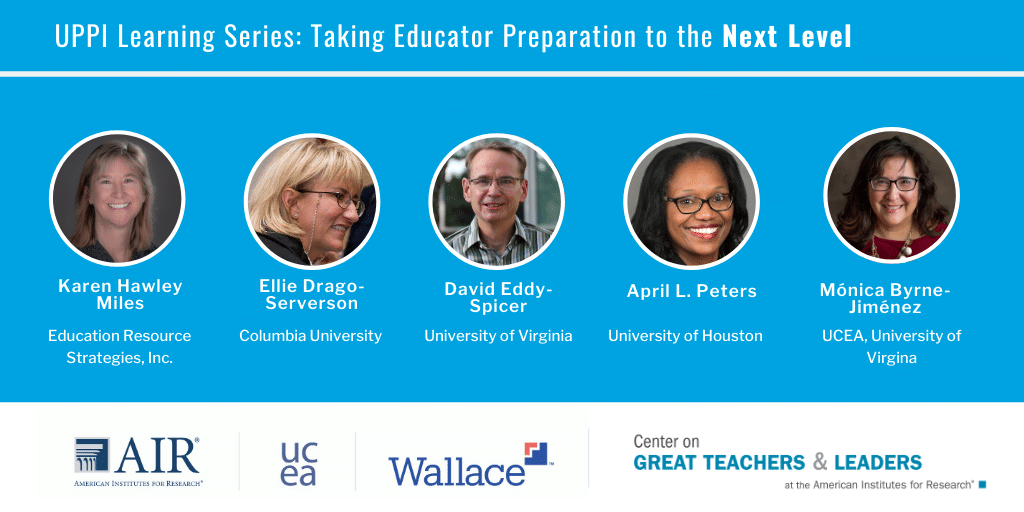
AACTE invites you to join us for the next session of The Wallace Foundation’s second University Principal Preparation Initiative (UPP) Learning Series. Teaming and engaging in meaningful and difficult conversations require teams to not only be open to learning together but also to develop their leadership abilities together. This session is designed to equip teams with tools to strengthen teamwork and engage in conversations that cultivate the leadership capacity of one another.
- Facilitator: Ellie Drago Serverson, professor of education leadership and adult learning and leadership, and director of the PhD Program in Education Leadership, Teachers College, Columbia University
- Thursday, July 16, 2020
- Presentation: 1:00–1:45 p.m. EST
- UPPI member-only discussion: 1:45–2:30 p.m. EST (A separate email will be sent with registration link for this session to all UPPI member registrants.)
- Register for the presentation.
10 Jul2020
AACTE DEI Video: A Focus on Recruiting and Retaining Black and Hispanic/Latino Male Teachers
By Jerrica Thurman
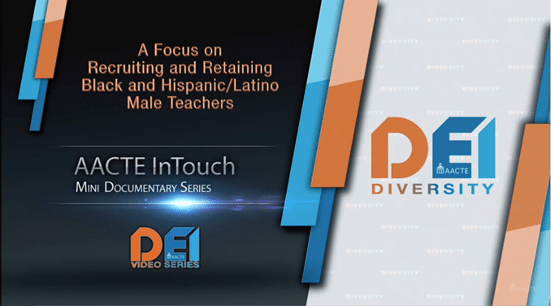
Ed Prep Matters features the “Revolutionizing Education” column to spotlight the many ways AACTE, member institutions, and partners are pioneering leading-edge research, models, strategies and programs that focus on the three core values outlined in the current AACTE strategic plan: Diversity, Equity, and Inclusion; Quality and Impact; and Inquiry and Innovation.
During this segment of the Diversity, Equity and Inclusion video series, AACTE members who participated in a 5-year study discuss their findings on ways to increase representation of men of color into the teaching profession. In “A Focus on Recruiting and Retaining Black and Hispanic/Latino Male Teachers,” researchers share the collective approaches campus-wide and across generations and disciplines required to effectively diversify the teacher pipeline.








 In Part 2 of this Q&A feature, AACTE consultant Jane West, a former teacher with a doctorate in special education and 30 years of policy experience in the nation’s capital, and Holmes Program Alumna Ashley L. White, assistant professor at the University of Wisconsin and 2019-20 Joseph P. Kennedy Fellow, share their mentoring/mentee relationship and how it has evolved over time to address race. (
In Part 2 of this Q&A feature, AACTE consultant Jane West, a former teacher with a doctorate in special education and 30 years of policy experience in the nation’s capital, and Holmes Program Alumna Ashley L. White, assistant professor at the University of Wisconsin and 2019-20 Joseph P. Kennedy Fellow, share their mentoring/mentee relationship and how it has evolved over time to address race. ( When the COVID-19 pandemic began, many teachers, students, and parents rushed to navigate online learning. Some schools may reopen with social distancing guidelines in place, while others may incorporate a virtual component. To limit COVID-19 exposure while maintaining the quality of education for students, educators will need to embrace online instruction.
When the COVID-19 pandemic began, many teachers, students, and parents rushed to navigate online learning. Some schools may reopen with social distancing guidelines in place, while others may incorporate a virtual component. To limit COVID-19 exposure while maintaining the quality of education for students, educators will need to embrace online instruction.
 The following article is Part 2 of an article by AACTE member Alex Cuenca in which he highlights the tensions involved in continuing student teaching in the fall and shares a guidepost for educator preparation programs during the COVID-19 pandemic.
The following article is Part 2 of an article by AACTE member Alex Cuenca in which he highlights the tensions involved in continuing student teaching in the fall and shares a guidepost for educator preparation programs during the COVID-19 pandemic. 
 We live in a society that is rapidly changing. The worldwide pandemic has shown us the harsh, but important, reality that divisiveness, inequality, and discrimination persist in our country. The murders of George Floyd, Ahmaud Arbery, Breonna Taylor, and too many others are stark evidence that racism still has deep and seemingly impenetrable roots in our country. This profound moment in time has brought despair to and heightened protest not only within the Black American community, but to people of all races throughout our country and the world. While addressing and rectifying these injustices requires the concerted effort of all American citizens, educators play an essential role in creating and ensuring an equitable existence for everyone.
We live in a society that is rapidly changing. The worldwide pandemic has shown us the harsh, but important, reality that divisiveness, inequality, and discrimination persist in our country. The murders of George Floyd, Ahmaud Arbery, Breonna Taylor, and too many others are stark evidence that racism still has deep and seemingly impenetrable roots in our country. This profound moment in time has brought despair to and heightened protest not only within the Black American community, but to people of all races throughout our country and the world. While addressing and rectifying these injustices requires the concerted effort of all American citizens, educators play an essential role in creating and ensuring an equitable existence for everyone. The AACTE Board of Directors recently created
The AACTE Board of Directors recently created 

